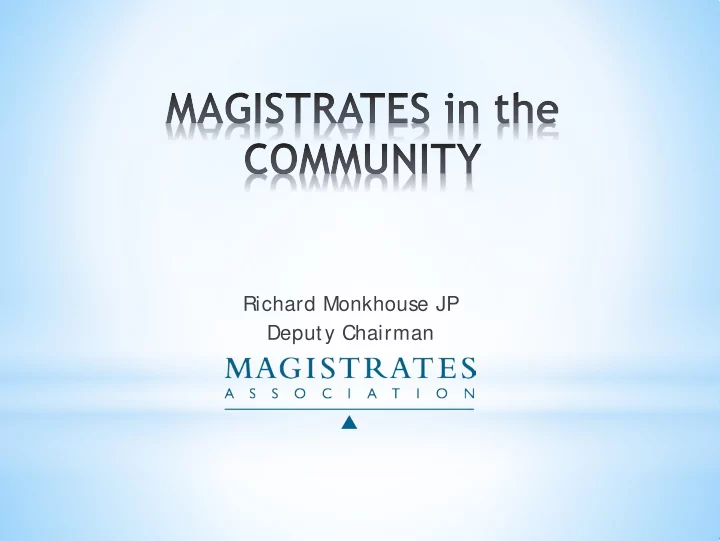

Richard Monkhouse JP Deputy Chairman
• JPs first appointed 1361 • S tarted to become more representative in 1919 when women allowed to be Magistrates. • Magistrates’ Association formed in 1921, governed under Royal Charter • Aims include education of Magistrates and the Public regarding the Criminal Justice S ystem. • Magistrates in the Community (MIC) started in 1990s
• Opened up the courts to the public • 60 Branches around the country • Material is current and verified • National resource is a continuing development
• S econdary S chools • Primary S chools • Colleges and Universities • Adult Groups • Interest Groups • Groups within the Criminal Justice S ystem, e.g. Police, Probation, Victim S upport, etc
• Factual • Court visits • S entencing and seriousness exercises • Mock trials • S tory cards • National MCMT Competition • Question Time Panels
Magistrates Criminal Justice S ystem S entencing Types of offence Consequences
Open days at court S itting in a court and witnessing what actually occurs. Talking to court users about their roles
Tailored to suit the audience. e.g. a couple of typical questions … Q. At what age can a person apply to become a Magistrate ? A. 18 25 40 Q. What would make an offence more serious? A. Group action Violence Victim is public servant … . can open up a wide range of discussions
Realistic cases. Offences from perspective of Victim and Offender Processes – what the law says we must do, can do and can’ t do.
Panels with different participants from within the Criminal Justice S ystem S entencers Lawyers Probation and Y outh Offending S ervice Victims and Witnesses Focus on specific issues of importance to schools and students
Primary S chool Mock Trial S cripts S cripts available from MA. S tory Cards Giving the whole class the opportunity to interpret a crime and its consequences in any way they want to.
National Magistrates’ Courts Mock Trial Competition (MA + Citizenship Foundation) Y ears 8 and 9 S tudents prosecute and defend cases Learn about the law Develops confidence
• Liaison between teachers and sentencers as experts • How best to communicate with students • Mixed set of presenters and skills • Mixed demands from students • Mixed skill levels • Range of options needed • Time constraints
• What else would you like to see • How can you advise us about what works • What about time constraints in S econdary S chools
• Not seeking to recruit • Not seeking to develop lawyers for the future • Want to make people aware of how the Criminal Justice S ystem works. • Want the public to be able to make a better more educated assessment of the CJS . • Want to explode the myths
Recommend
More recommend